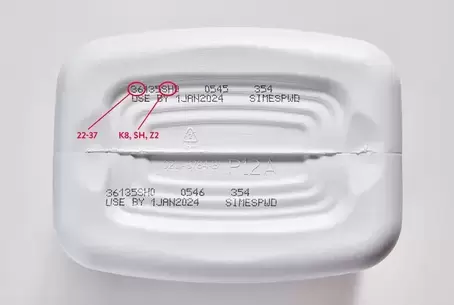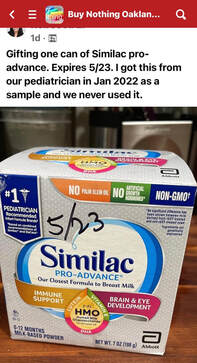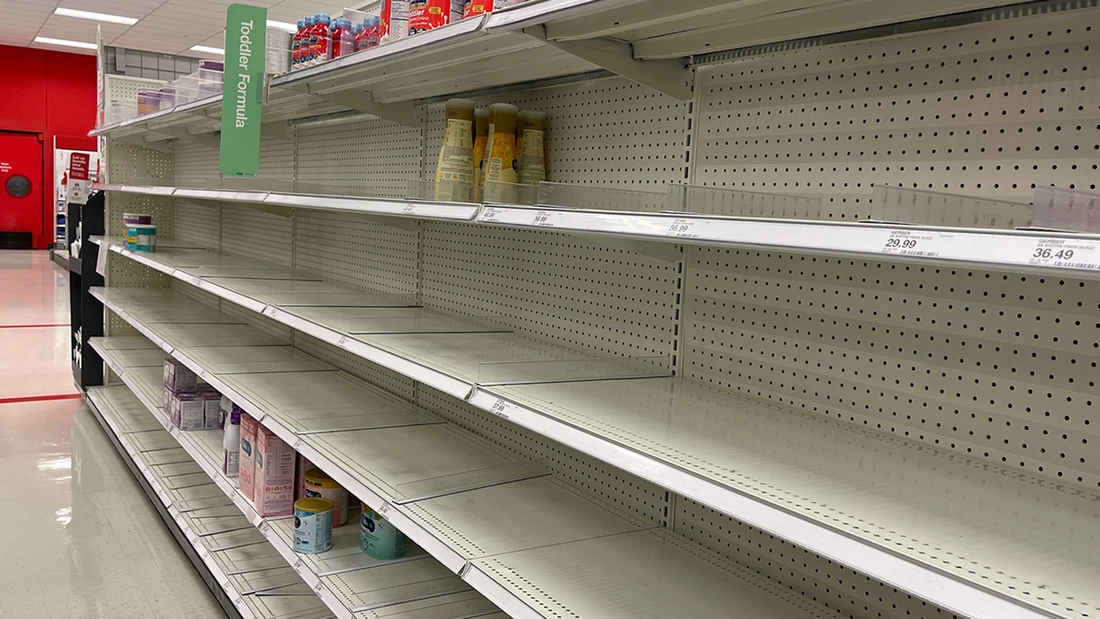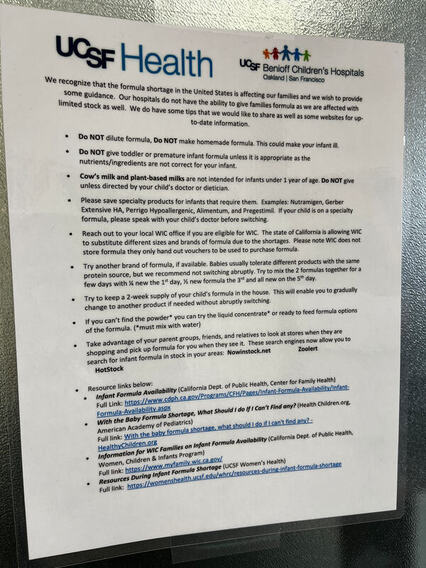"After the shutdown of the Abbott Laboratory in Sturgis, Michigan, parents have been scrambling to find food for their infants."--Reeghan Walsh, 8th Grade
| In September of 2021, two US Food and Drug Administration investigators arrived at an Abbott laboratory in Sturgis, Michigan, where about 20% of infant formula in the US is produced, and has been since the 1970s, according to The Bloomberg article, “How Deadly Bacteria Spread in a Similac Factory–and Caused the US Formula Shortage.” In addition, Abbott makes the country’s most popular formula, Similac. |
The inspection, which is typically annual, was delayed a year due to Covid-19, and when the administrators eventually arrived, they found a concerning issue: Evidence of an often deadly bacteria for infants called Cronobacter sakazakii was found in company records. Cronobacter is found in powdered formula, powdered milk, herbal teas, and starches. There isn’t much risk for adults, due to the fact that the bacteria is often boiled out of the mixtures that they consume. However, in baby formula, the mixture is not boiled, so the bacteria is not killed. While Cronobacter cases are rare, they can cause serious and sometimes fatal problems. The Cronobacter germs can cause sepsis, a blood infection, and meningitis, the swelling of the lining surrounding the brain and the spinal cord.
When cronobacter doesn’t kill, it can leave lifelong effects on infants. For instance, a girl born in 2008 named Jeanine Kunkel was brought back to the hospital within days of arriving home due to a fever. Born a twin, she had been delivered in good health, while her brother had to stay in the hospital for a few more nights due to some complications. But the tables quickly turned, and Kunkel developed meningitis, which resulted in irreversible brain damage. Her family tried to sue Abbott Laboratories in 2013, but were beaten out by Abbott’s lawyers, as the jury found that the company was not liable, and the bacteria could have come from the family’s own home.
But now, in 2022, over a decade later, cronobacter was raging inside of Abbott. “Abbott’s routine testing had turned up cronobacter at the plant five times in the previous two years, which isn’t unusual for a formula maker,” the same Bloomberg referenced, stated. “More concerning, the bacteria had twice made its way into the formula itself, in cans ready for distribution.” The company held back the cans in those batches, but didn’t recall any others. They also didn’t notify the FDA, but they weren’t required to.
The FDA expected Abbott to fix their contamination issues, but the inspectors found many signs of sloppiness. First, a worker reached into a bag containing an essential ingredient without cleaning his hands or gloves. They also found crucial drying equipment with a history of cracks where cronobacter could hide and multiply. Nonetheless, without issuing a warning, the inspectors left.
But there were still worries with the sanitization of the plant. A former employee filed a whistleblower report in October alleging that productivity sometimes compromised safety, and secretiveness with the FDA was encouraged. The report went unread by officials for two months before, finally, the FDA interviewed the former employee. A month after that, inspectors went back to Sturgis, at the end of January. They ended up finding five different strains of cronobacter. Abbott’s own tests in February came up with cronobacter 20 times.
When cronobacter doesn’t kill, it can leave lifelong effects on infants. For instance, a girl born in 2008 named Jeanine Kunkel was brought back to the hospital within days of arriving home due to a fever. Born a twin, she had been delivered in good health, while her brother had to stay in the hospital for a few more nights due to some complications. But the tables quickly turned, and Kunkel developed meningitis, which resulted in irreversible brain damage. Her family tried to sue Abbott Laboratories in 2013, but were beaten out by Abbott’s lawyers, as the jury found that the company was not liable, and the bacteria could have come from the family’s own home.
But now, in 2022, over a decade later, cronobacter was raging inside of Abbott. “Abbott’s routine testing had turned up cronobacter at the plant five times in the previous two years, which isn’t unusual for a formula maker,” the same Bloomberg referenced, stated. “More concerning, the bacteria had twice made its way into the formula itself, in cans ready for distribution.” The company held back the cans in those batches, but didn’t recall any others. They also didn’t notify the FDA, but they weren’t required to.
The FDA expected Abbott to fix their contamination issues, but the inspectors found many signs of sloppiness. First, a worker reached into a bag containing an essential ingredient without cleaning his hands or gloves. They also found crucial drying equipment with a history of cracks where cronobacter could hide and multiply. Nonetheless, without issuing a warning, the inspectors left.
But there were still worries with the sanitization of the plant. A former employee filed a whistleblower report in October alleging that productivity sometimes compromised safety, and secretiveness with the FDA was encouraged. The report went unread by officials for two months before, finally, the FDA interviewed the former employee. A month after that, inspectors went back to Sturgis, at the end of January. They ended up finding five different strains of cronobacter. Abbott’s own tests in February came up with cronobacter 20 times.

On February 17, 2022 Abbott issued a recall for Similac, Similac Alimentum, and EleCare powdered formula containing expiration dates from April 1, 2022, or later. The recalled formula containers have numbers on the bottom: 22 through 37, containing K8, SH, or Z2.
The Sturgis plant has since stopped production. This resulted in a nationwide powdered infant formula shortage. This caused great issues for families with infants. Especially with those who could not switch formulas. Karah Weiser, from Delaware County, Pennsylvania, has an 8 month old son who has a dairy allergy, and has to stick with the same formula: Nutramigen Hypoallergenic Formula and Puree. While this specific product has not been recalled, Similac Alimentum is similar to it, so parents who were able to switch their infants over to Nutramigen Hypoallergenic, most likely did, and therefore, there was less available on shelves. “I once had to call over fifteen stores who were all out of it,” Weiser recalled.
Not only was it hard on families that couldn’t switch formulas, but it was hard on families who had to switch. Gracee Franklin, also from Delaware County, Pennsylvania, said her 10 month old daughter had various issues with switching. “She was vomiting yellow [and] orange, had bad BM [bowel movements], and had a rash,” Franklin stated. Other moms, like Amelia Rowland Carr, mom of a 6 month old boy, from Oakland, California, said her infant had different reactions to different formulas. “For example, on Earth’s Best he spit up a lot more and on Enfamil he was super gassy,” Carr explained. Or Mary Howley, from Delaware County, Pennsylvania, with a 5 month old. Her daughter has been switched a couple times. Once, she had a tough reaction, the formula not agreeing with her stomach.
For some parents, it wasn’t the sickness that caused stress with the formula switching, it was the lack of feeding. Delaware County, Pennsylvania resident Melinda Pendergraft, mom of a 16 month old, who was born at 29 weeks (premature), expressed her rough times. “It was difficult to keep switching formulas because she wouldn’t drink as much as she was supposed to and it was concerning because she is a preemie.” Pendergraft said. “As soon as we were allowed to switch over to milk, we started weaning her off formula.”
For some parents, formula is the only way they can get their baby food. Rowland Carr is a resource parent (foster parent), so the only way to feed her infant was via formula. Not only foster parents, but LGBTQI+ parents, or parents with disabilities or complications that make them unable to breastfeed are also affected.
Parents and caregivers, especially single parents, face even more challenges. With the Covid-19 pandemic still having a lasting impact on certain minorities, like people of color, or women, that may have been laid off, or had their wages cut. "Not knowing if you were going to find formula when you needed it–and be limited to what you could get when it was there–was not an easy mental or emotional load to carry," Carr recollected. "Imagine not knowing if you were going to be able to feed a baby. I can't imagine for families not as privileged as my own to have friends and a community who were able to check-in on us and support us what it would have been like."
It was a lot for parents to constantly be checking stores and websites. "It was extremely stressful finding anything for a while. Constantly check Target, Walmart, BJS online," Margaret Sharp, resident of Delaware County, Pennsylvania and mom of a 12 month old daughter, remembered. "Calling drug stores like CVS and Walmart if the website had it in stock at a certain location, only to find out it wasn't actually in stock. Asking friends and family to look for anything they can find.
"Not being able to find your baby's only source of food is beyond stressful," Howley added. "I'll never forget that sinking feeling in my stomach while calling stores everyday to see if I could get even one bottle.
The Sturgis plant has since stopped production. This resulted in a nationwide powdered infant formula shortage. This caused great issues for families with infants. Especially with those who could not switch formulas. Karah Weiser, from Delaware County, Pennsylvania, has an 8 month old son who has a dairy allergy, and has to stick with the same formula: Nutramigen Hypoallergenic Formula and Puree. While this specific product has not been recalled, Similac Alimentum is similar to it, so parents who were able to switch their infants over to Nutramigen Hypoallergenic, most likely did, and therefore, there was less available on shelves. “I once had to call over fifteen stores who were all out of it,” Weiser recalled.
Not only was it hard on families that couldn’t switch formulas, but it was hard on families who had to switch. Gracee Franklin, also from Delaware County, Pennsylvania, said her 10 month old daughter had various issues with switching. “She was vomiting yellow [and] orange, had bad BM [bowel movements], and had a rash,” Franklin stated. Other moms, like Amelia Rowland Carr, mom of a 6 month old boy, from Oakland, California, said her infant had different reactions to different formulas. “For example, on Earth’s Best he spit up a lot more and on Enfamil he was super gassy,” Carr explained. Or Mary Howley, from Delaware County, Pennsylvania, with a 5 month old. Her daughter has been switched a couple times. Once, she had a tough reaction, the formula not agreeing with her stomach.
For some parents, it wasn’t the sickness that caused stress with the formula switching, it was the lack of feeding. Delaware County, Pennsylvania resident Melinda Pendergraft, mom of a 16 month old, who was born at 29 weeks (premature), expressed her rough times. “It was difficult to keep switching formulas because she wouldn’t drink as much as she was supposed to and it was concerning because she is a preemie.” Pendergraft said. “As soon as we were allowed to switch over to milk, we started weaning her off formula.”
For some parents, formula is the only way they can get their baby food. Rowland Carr is a resource parent (foster parent), so the only way to feed her infant was via formula. Not only foster parents, but LGBTQI+ parents, or parents with disabilities or complications that make them unable to breastfeed are also affected.
Parents and caregivers, especially single parents, face even more challenges. With the Covid-19 pandemic still having a lasting impact on certain minorities, like people of color, or women, that may have been laid off, or had their wages cut. "Not knowing if you were going to find formula when you needed it–and be limited to what you could get when it was there–was not an easy mental or emotional load to carry," Carr recollected. "Imagine not knowing if you were going to be able to feed a baby. I can't imagine for families not as privileged as my own to have friends and a community who were able to check-in on us and support us what it would have been like."
It was a lot for parents to constantly be checking stores and websites. "It was extremely stressful finding anything for a while. Constantly check Target, Walmart, BJS online," Margaret Sharp, resident of Delaware County, Pennsylvania and mom of a 12 month old daughter, remembered. "Calling drug stores like CVS and Walmart if the website had it in stock at a certain location, only to find out it wasn't actually in stock. Asking friends and family to look for anything they can find.
"Not being able to find your baby's only source of food is beyond stressful," Howley added. "I'll never forget that sinking feeling in my stomach while calling stores everyday to see if I could get even one bottle.

But even in the face of challenge, families and friends persisted, and supported each other. “My friend runs a [Facebook] page called ‘delco formula finders.’ It really was great help. Everyone would take a photo of the formula shelf and post location and time–saved many tears and time,” Franklin offered. Additionally, Carr had friends buy whatever formula was available whenever they went to the store. “Buy Nothing” Facebook groups were also a help to parents searching for infant formula. “Buy Nothing” groups are exactly what they sound like, people giving things away for free. So people would post about having baby formula, and people would pick it up from their houses.
The formula shortage was, and still is, a devastation. However, it is expected to get better. There are resources for families that need help during this time: Information, checking stores and websites, and talking to your pediatrician. Abbott CEO, Robert Ford, wrote an apology statement on May 21st. Hopefully, now that Sturgis has reopened, things will be rolling faster and safer from now on.
The formula shortage was, and still is, a devastation. However, it is expected to get better. There are resources for families that need help during this time: Information, checking stores and websites, and talking to your pediatrician. Abbott CEO, Robert Ford, wrote an apology statement on May 21st. Hopefully, now that Sturgis has reopened, things will be rolling faster and safer from now on.




